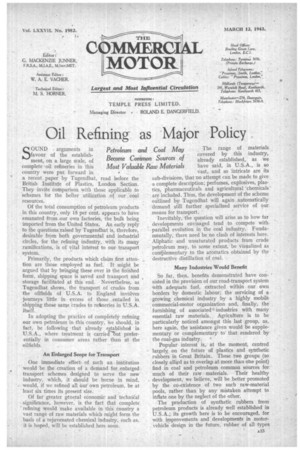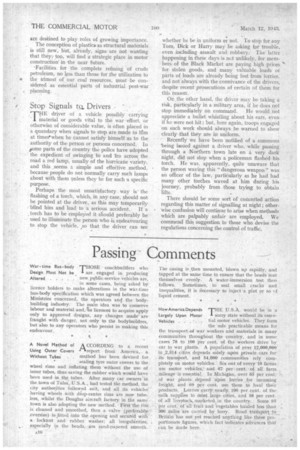Oil Refining as - Major Policy.
Page 17

Page 18

If you've noticed an error in this article please click here to report it so we can fix it.
SOUND, arguments in favotir of the establishment, on a large scale, of complete •oil refineries in this country were put forward in a recent paper by Tugendhat, read before the British Institute of Plastics, London Section. They invite comparison with those applicable to schemes for the barter utilization of our :coal resources.
Of the total consumption of petroleum products in this country, only 15 per cent. appears to have emanated from .our own factories, the bulk being imported from the United States. An early reply to the questions raised by Tugendhat is, therefore, desirable from both governmental and industrial circles, for the refining industry, with its many ramifications, is of vital interest to our transport system.
Primarily, the products which claim first attention are those, employed as fuel. It might be argued that by bringing these over in the finished form, shipping space is saved and transport and storage facilitated at this end. Nevertheless, as .Tugendhat shows, the transport of crudes from the oilfields of U.S.A. to England involves journeys little in excess of those .entailed in shipping those same Crudes to refineries in U.S.A. itself.
In adopting the practice of completely refining our own petroleum in this country, we should, in fact, be following that already eblished in U.S.A., where treatment is carried—dut preferentially in consumer areas rather than at the oilfields.
An Enlarged Scope for Transport One immediate effectof such art institution would be the creation of a demand for enlarged transport schemes designed to serve the new industry, which, it should be borne in mind, , would, if we refined all our' own petroleum, be at least six times its present size.
Of far greater general economic and technical significance, however, is the fact that complete refining would make available in this country a vast range of raw materials which might form the basis of a rejuvenated chemical industry, such as, it is hoped, will be established here soon. The range of materials covered by this industry, already established, as We have said, in U.S.A., is so vast, and so intricate are its sub-divisions, 'that no attempt can be made to give a complete description; perfumes, explosives, plastics, pharmaceuticals and agricultural 'chemicals are included. Thus, the development of the scheme outlined by. Tugendhat will again automatically demand still further specialized service of our means for transport. Inevitably, the question will arise as to how far developments envisaged tend to compete with. parallel evolution in the coal industry'. Fundamentally, there need be no clash of interests here. Aliphatic and unsaturated products from crude petroleum may, to some extent, be visualized as coniPlementary to the aromatics obtained by the destructive distillation of coal.
Many Industries Would Benefit So far, then, benefits demonstrated have consisted in the provision of our road-transport system with adequate fuel, extracted within our own borders by domestic labour; the servicing of a growing chemical industry by a highly mobile commercial-motor organization and, finally, the furnishing of associated industries with many essential raw materials. Agriculture is to be particularly noticed amongst this last group, as, here again, the assistance given would be supplementary or complementary to' that rendered by the coal-gas industry.
Popular interest is, at the moment, centred largely on the future of plastics and synthetic rubbers in Great Britain. These two groups (so closely allied as to overlap at more than one point) find in coal and petroleum common sources for much of their raw materials. Their healthy development,we believe, will be better promoted by the co-existence of two such raw-material pools, rather than by any mistaken attempt to inflate one by the neglect of the other.
The production of synthetic rubbers from petroleum products is already well established in U.S.A.; its growth here is to be encouraged, for with improvements and developments in motorvehicle design in the future, rubber of all types are destined to play roles of growing importance.
The conception of plastics. as structural materials is still new, but, already, signs are not wanting that they; top, will find a strategic place in motor construction' in the near future.
-Facilities for the complete refining of crude petroleum, no Less than those for _the utilization to • the tamost of our coal resources, must be considered as essential parts of industrial post-war planning.
Stop Signals to, Drivers •
TFE driver of a vehicle possibly carrying material or goods vital to the war effort. or otherwise of considerable value, is often placed in a quandary when signals to stop are made to him at times•when he cannot satisfy himself as to the authority of the person or persons concerned. In tome parts of the country thepolice have adopted the expedient of swinging to and 'fro across. the road a red lamp, usually of the hurricane variety, and this seems a simple and effeCtive method, because people do not normally carry such lamps about with them unless they be for such a specific purpose.
Perhaps the most unsatisfactory way is the flashing of a torch, which, in any case, should not be pointed at the driver, as this may temporarily blind him and lead to a serious accident. If a , torch has to be employ-ed it should preferably be used to illuminate the person who ia endeavouring to stop the vehicle, ;so that the driver can see whether he be in aniform or not. To step for any Tom, Dick or Harry may be asking for trouble, even including assault and robbery. The latter happening in these days is flat unlikely, for members 6f the Black Market are paying high prices for stolen goods, and many valuable loads or parts of loads are already being lost from lorries, and not always with the connivance of the drivers, despite recent prosecutions of certain of them for this reason.
On the other hand, the driver may be taking a risk, particularly in a Military area, if he does not stop immediately on command. He would not appreciate a bullet whistling about his ears, even if he were not hit ; but, here again, troops engaged on such work should always be warned to show clearly that they are in uniform.
• Recently we have been notified of a summons. 'being Iwued against a driver who, while passing through a Northern town late on a very dark night; did not stop when a policeman flashed his torch. He was, apparently, quite unaware that the person waving this "dangerous weapon" was an officer of the law, particularly as he had had many other torches waved at him during his journey, probably from those trying to obtain There should be some sort of Concerted action regarding this matter of signalling at night ; other . 'wise confusion will continue to arise when methods which are palpably unfair are employed. We commend this suggestion to those who devise the regulations concerning the. control of traffic. •




























































